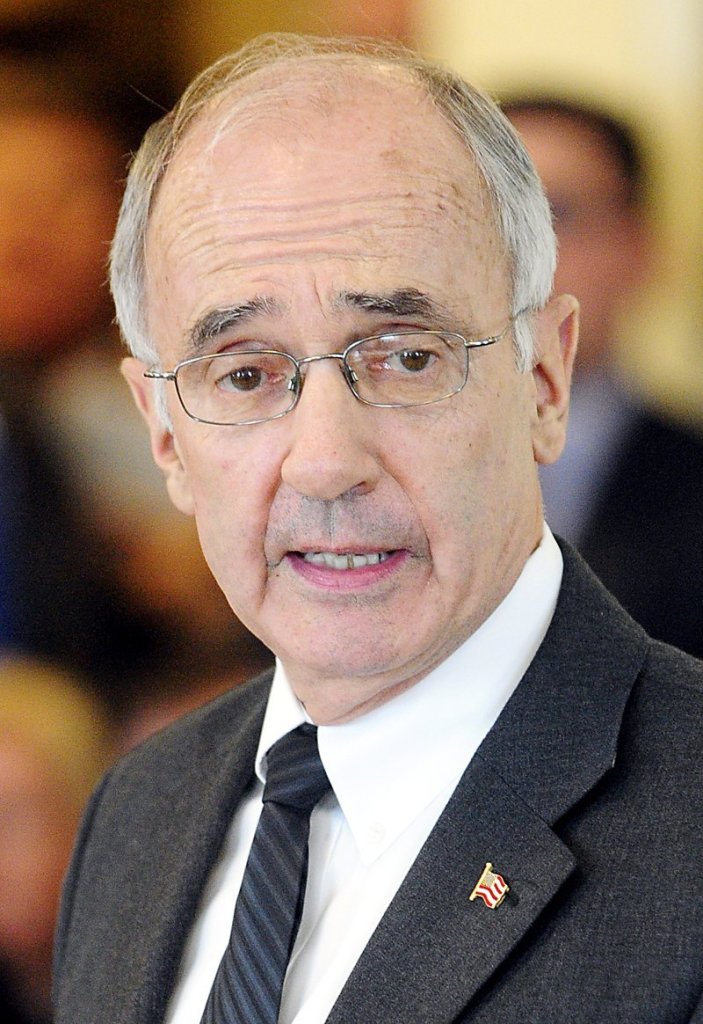AUGUSTA – Gov. Paul LePage said Thursday that he is pursuing a change in the conflict-of-interest provision in Maine law that prompted this week’s resignation of Darryl Brown as commissioner of the Department of Environmental Protection.
LePage called it a “poorly written law” that is keeping high-quality, experienced people from serving in the DEP.
The state law, which mirrors federal law, says a person may not be DEP commissioner if they receive, or have received in the two years before their appointment, 10 percent or more of their gross personal income from Clean Water Act permit holders or applicants. Anyone who is older than 60 and retired is ineligible if they receive 50 percent or more of their retirement or pension from permit holders.
Without the provision, Maine would lose certain environmental permitting authorities, said Steve Hinchman, an attorney for a group that appealed Brown’s eligibility to the U.S. Environmental Protection Agency.
But LePage said it is too restrictive.
“I will seek to have it removed because we need to have good people like Darryl Brown being able to work for state government,” he said in an impromptu news conference.
Brown owns an environmental consulting firm that has clients that hold Clean Water Act permits. After Hinchman’s group raised the issue with the EPA regarding the federal provision, Brown hired a personal attorney to examine his finances to determine whether his income met the threshold.
Last week, his attorney, Clinton Boothby, sent a letter to the EPA and Maine Attorney General William Schneider that said Brown’s income from permit holders “may” exceed 10 percent.
Schneider issued a letter Wednesday that said, absent any new information such as financial records showing Brown did not meet the threshold, Brown was “unqualified” to serve as commissioner.
Brown, who put his company up for sale when he was appointed, said he did not want to subject financial records to public scrutiny because it would have diminished the company’s value and exposed potentially sensitive information about clients. He resigned instead, and was named director of the State Planning Office.
LePage and Brown were upset that Maine’s law does not allow the same flexibility as the federal provision. Under the federal law, Brown could have continued serving if he delegated certain permitting authority to his staff.
“From the standpoint of the EPA regulations, they were fine with it. There were some things he would have to do in certain situations,” LePage said Thursday.
Brown said the Maine law is just “silliness.”
But Hinchman, the environmental lawyer, says it serves a valid purpose. “This is a national standard; it was put in place precisely for this reason,” he said in a recent interview.
Hinchman said that while Congress was drafting the Clean Water Act, a news report revealed that state water pollution boards were dominated by representatives from polluting industries.
“Congress decided that would be an illegal conflict of interest because you couldn’t have people representing polluters overseeing the very companies that they are supposed to be regulating,” he said. “They specifically said this shall apply nationwide and shall apply to anybody with any authority over permitting decisions.”
That includes members of Maine’s Board of Environmental Protection, which has permitting authority in certain circumstances.
LePage issued letters to all 10 citizen board members Wednesday, asking for their relevant financial information so it can be reviewed to ensure they are all in compliance with the law.
“While federal law allows for flexibility in this matter through recusal and delegation, the attorney general has recently noted that Maine law is stringent and unyielding,” LePage wrote.
Susan Lessard, the board’s chair, did not return a call for comment.
It’s unclear at this point how much support LePage’s effort to change the law has among lawmakers.
House Speaker Bob Nutting, R-Oakland, said he would be interested in pursuing legislation if it is a bipartisan interest.
House and Senate Democratic leaders met with LePage administration officials late Thursday to discuss the issue.
Sen. Seth Goodall, D-Richmond, a member of the Legislature’s Environment and Natural Resources Committee, said he would support a “thorough and thoughtful” review of the law.
Hinchman said that weakening the conflict-of-interest provision would increase red tape in Maine.
“The only way the governor could make the changes he’s talking about,” Hinchman said, “would be to create two DEPs, one for state permits and one for federal permits, which essentially would be to double the size of the DEP.”
MaineToday Media State House Writer Rebekah Metzler can be contacted at 620-7016 or at:
rmetzler@mainetoday.com
Send questions/comments to the editors.


